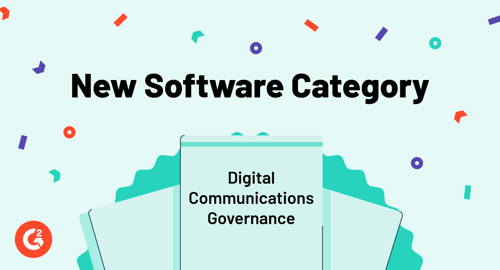Digital communications have helped organizations and individuals alike.
These platforms help people connect and share ideas easily. With that comes the important responsibility of digital communications governance to keep the communication safe. One of which is recordkeeping. Failing to adhere to the regulations can incur huge fines from the government.
With growing digital communications platforms, the need to safeguard this communications data is also on the rise.
G2 recently introduced a new category called Digital Communications Governance to help buyers address these issues and guide them in finding the right digital communications governance software.
What is digital communications governance software?
Digital communications governance software helps regulate, manage, and optimize communications processes in digital communications. The software provides protection or governance coverage for communication channels such as videos, messages, emails, and so on.
How does digital communications governance software help?
Digital communications governance software has a unique range of features from various other governance, privacy, or security software to manage and govern digital communications.
Without the software, organizations face increased vulnerability to security breaches, regulatory non-compliance, inconsistent communication practices, and heightened risks of data leaks, leading to reputational damage and potential legal consequences.
The following features of digital communications governance software highlight its many benefits to organizations:
Policy management: Digital communications governance software provides customizable policy templates to align with organizational standards. This feature provides a peek into the rules and ensures that none of those are violated. It provides the framework to address regulatory requirements, mitigate risks, and maintain consistency in communication practices across the organization.
Compliance management: Another important feature of this software solution is compliance management. It ensures adherence to industry regulations and legal requirements by regularly updating policies based on regulation changes.
Monitoring and surveillance: This feature helps constantly monitor digital communications in real time. Digital communications governance software helps the system enforce pre-defined communication policies.
Digital communication governance platforms help organizations in various ways:
- Data security: Digital communication governance platforms help keep the data secure and avoid any breach of confidentiality.
- Regulatory compliance: Many countries have laws to maintain communications regulations such as CCPA, GDPR, and so on. Not abiding by these can result in hefty fines or even suspensions.
- Risk mitigation: A well-maintained record of all business communications can prove to be of extreme importance in the case of any litigation.
- Reputation management: Abiding by the regulations can build a sense of trust amongst the organization's clients.
Categories on G2 related to digital communications governance
G2 offers several software categories related to digital communications governance, all with the shared goal of safeguarding data. The categories are as follows:
Anti-money laundering software helps financial institutions and businesses to detect and prevent money laundering activities. It conducts customer due diligence and real-time transaction monitoring, and generates alerts for suspicious transactions.
GRC tools help organizations manage governance and compliance activities. Audit management, risk management, and compliance management are some of the significant functions of these platforms.
Security compliance software helps organizations to meet regulatory requirements, industry standards, and internal policies.
Investigation management software helps streamline the process of investigation. Features such as case management, incident reporting, and evidence management highlight the resemblance with digital communications governance software.
Disclosure management software helps create and manage financial and regulatory disclosures.
Enterprise risk management software helps organizations identify, access, and manage any risks affecting business processes.
Call compliance software ensures that companies adhere to the regulatory requirements and internal policies associated with the communications.
The way forward
With a growing emphasis on data protection, digital communications platforms will focus more on individual data privacy in the coming days.
Greater integration with cybersecurity solutions will help in a unified approach. This may be made possible with real-time threat detection, unified security policies, automated incident response, data loss prevention, and so on.
Delve into the exciting possibilities and insights on how artificial intelligence is set to revolutionize email communication as we know it.
Edited by Sinchana Mistry


 by Shalaka Joshi
by Shalaka Joshi
 by Shalaka Joshi
by Shalaka Joshi
 by Shalaka Joshi
by Shalaka Joshi